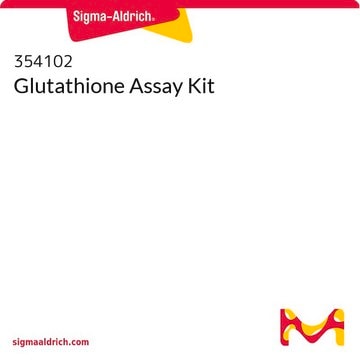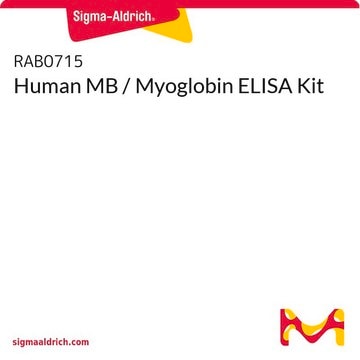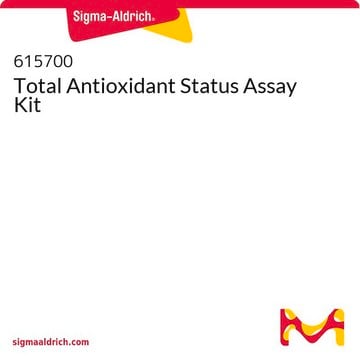38185
Quantification kit for oxidized and reduced glutathione
200 tests
Synonyme(s) :
γ-L-glutamyl-L-cysteinylglycine kit, Quantification kit
Se connecterpour consulter vos tarifs contractuels et ceux de votre entreprise/organisme
About This Item
Code UNSPSC :
12352108
Nomenclature NACRES :
NA.32
Produits recommandés
Catégories apparentées
Description générale
Glutathione Quantification Kit is designed to detect oxidized and reduced Glutathione. Glutathione is usually represented in a reduced form called GSH; however, GSH is converted into its oxidized state (GSSG) upon oxidative stress. The ratio between GSH and GSSG is considered an index for oxidative stress. Glutathione, also known as γ-L-glutamyl-L-cysteinylglycine, is a tripeptide compound that is involved in anti-oxidation and drug metabolism. It acts as a substrate for enzymes like glutathione peroxidase, glutathione S-transferase, and thiol transferase.
Application
Glutathione Quantification Kit is used to detect the total amount of glutathione as an index for oxidative stress or disease risk.
Caractéristiques et avantages
The detection ranges of total glutathione and GSSG using in this kit are from 0.5 μmol/l to 50 μmol/l and from 0.5 μmol/l to 25 μmol/l, respectively.
Composants
Glutathione Quantification Kit contains:
- Enzyme Solution (50µl X 1)
- Buffer Solution (60ml X 1)
- Standard GSH (X 1)
- Masking Reagent (20µl X 1)
- Co-enzyme (X 2)
- Substrate (DTNB) (X4)
- Standard GSSG (X 1)
Remarque sur l'analyse
Glutathione Quantification Kit contains a GSH masking reagent. This enables GSSG detection in the sample by measuring the absorption (λmax = 412 nm) obtained from a colorimetric reaction of DTNB (5,5’-dithiobis (2-nitrobenzoic acid)) coupled with the enzymatic recycling system. The total quantity of GSH can be measured by subtracting the amount of GSSG from the total amount of glutathione.
Autres remarques
not available in Korea, Singapore, Taiwan and Japan
Mention d'avertissement
Danger
Mentions de danger
Conseils de prudence
Classification des risques
Eye Irrit. 2 - Flam. Liq. 2 - Skin Irrit. 2 - Skin Sens. 1
Code de la classe de stockage
3 - Flammable liquids
Certificats d'analyse (COA)
Recherchez un Certificats d'analyse (COA) en saisissant le numéro de lot du produit. Les numéros de lot figurent sur l'étiquette du produit après les mots "Lot" ou "Batch".
Déjà en possession de ce produit ?
Retrouvez la documentation relative aux produits que vous avez récemment achetés dans la Bibliothèque de documents.
Les clients ont également consulté
Anna Maria Czarnecka et al.
Nutrients, 12(7) (2020-07-28)
Acute liver failure (ALF) impairs cerebral function and induces hepatic encephalopathy (HE) due to the accumulation of neurotoxic and neuroactive substances in the brain. Cerebral oxidative stress (OS), under control of the glutathione-based defense system, contributes to the HE pathogenesis.
Hidemasa Katsumi et al.
Metallomics : integrated biometal science, 6(5), 1050-1056 (2014-03-25)
Reactive oxygen species (ROS) are involved in the pathophysiology of ischemia/reperfusion injury. To protect mouse hepatocytes from ischemia/reperfusion injury, we prepared two different sizes of citric acid-protected platinum nanoparticles (Pt-NPs), which exhibited ROS-scavenging activities and selective delivery to a specific
Hayato Nakagawa et al.
Cancer cell, 26(3), 331-343 (2014-08-19)
Endoplasmic reticulum (ER) stress has been implicated in the pathogenesis of viral hepatitis, insulin resistance, hepatosteatosis, and nonalcoholic steatohepatitis (NASH), disorders that increase risk of hepatocellular carcinoma (HCC). To determine whether and how ER stress contributes to obesity-driven hepatic tumorigenesis
Samuel Coelho Faria et al.
Scientific reports, 8(1), 2850-2850 (2018-02-13)
The antioxidant defense system (ADS) protects organisms against the potential oxidative stress induced by environmental features, underlying processes of habitat diversification. The anomurans Aegla constitute the most threatened freshwater decapods of South America, occupying pristine habitats with narrow distribution. Using
Hany H Arab et al.
Chemico-biological interactions, 335, 109368-109368 (2021-01-08)
Dapagliflozin, a selective sodium-glucose co-transporter 2 (SGLT2) inhibitor, has featured marked anti-inflammatory effects in murine models of myocardial infarction, renal injury, and neuroinflammation. Yet, its potential impact on the pathogenesis of inflammatory bowel diseases (IBD) has not been previously investigated.
Notre équipe de scientifiques dispose d'une expérience dans tous les secteurs de la recherche, notamment en sciences de la vie, science des matériaux, synthèse chimique, chromatographie, analyse et dans de nombreux autres domaines..
Contacter notre Service technique











